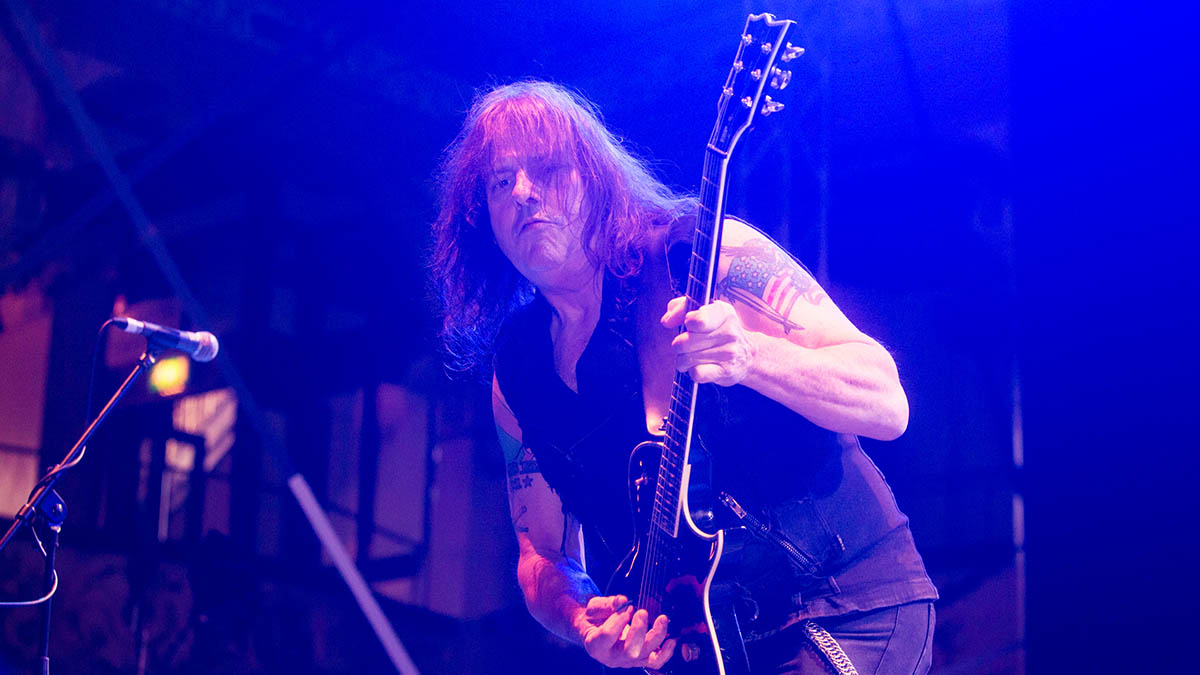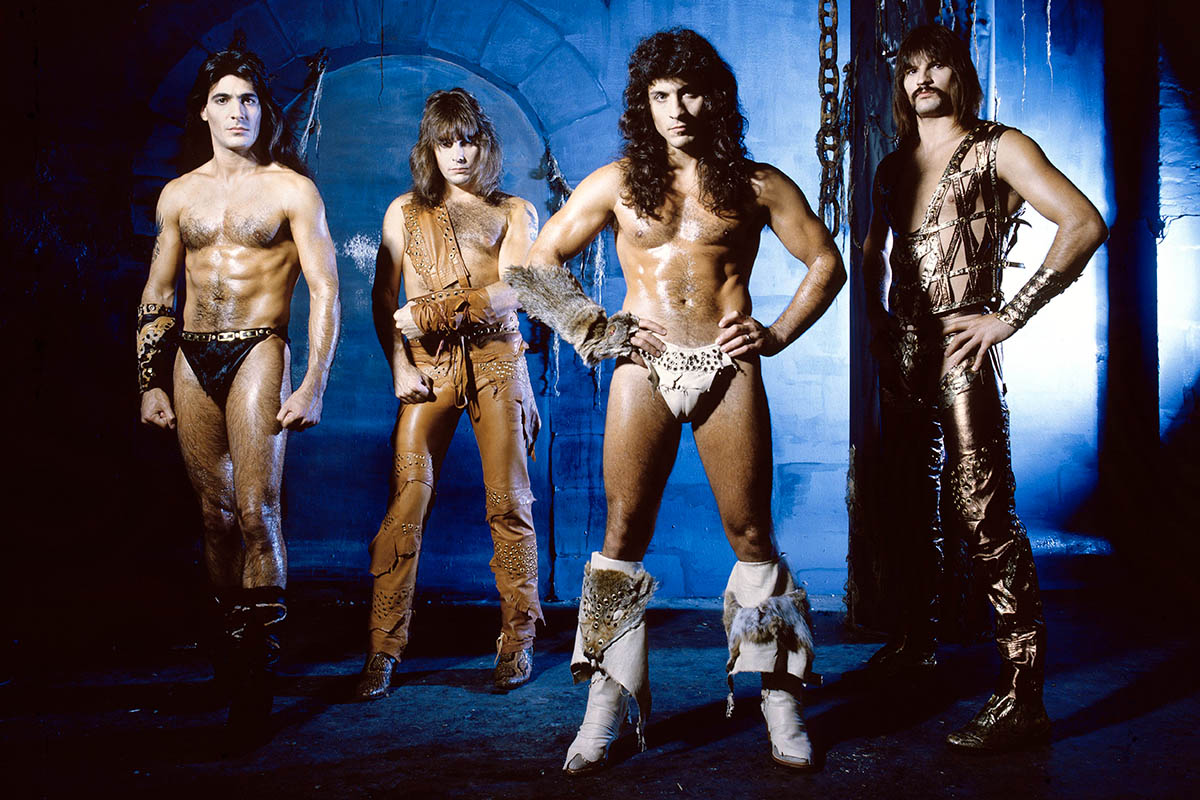Ross “the Boss” Friedman: “The Ramones were like our brothers... We were very different bands, but we both had the swagger and attitude”

Ross “the Boss” Friedman’s muscular riffs and robust solos have powered not one, but two seminal New York-based bands that he co-founded: During the 1970s, there was the proto-punk/garage rock kings the Dictators, followed a decade later by the wildly influential power metal outfit Manowar.
However, despite his brawny approach to the guitar, Friedman first got the six-string itch from watching a lovable pack of madcap TV mop tops.
“Oh, I loved the Monkees,” Friedman says. “As a kid, seeing them on TV was really exciting. They had amazing songs. I could really relate to Last Train to Clarksville. What a solo! Of course, I didn’t know it was studio musicians on those first records, and it didn’t matter. The playing was incredible.”
The Monkees were Friedman’s gateway drug into the rock ’n’ roll of the era. “The Beach Boys, the Who, the Doors, Jimi Hendrix and, of course, I loved the Beatles and Stones,” he says. “It was really an exciting time. And for the most part, each band had a really incredible guitar player.”
Before long, he ditched his piano and violin lessons and picked up the guitar. “I was a young Jewish kid with glasses and short hair. I had to change my image, so I became a rocker.”
He also started listening to the pioneering bands of heavy metal, listing Iron Butterfly, Steppenwolf and Black Sabbath as significant influences. “All those hard rock groups spoke to me,” Friedman says. “When I met [bassist] Andy Shernoff, we discovered that we were into the same stuff, so we decided to make the Dictators all about our shared loves.”
With the Dictators, Friedman experienced the New York punk explosion of the early Seventies firsthand. He recalls sharing bills with the Ramones at CBGBs: “We both played there a lot – we were probably a year ahead of them. The Ramones were like our brothers. We were from the Bronx, they were from Queens. We were very different bands, but we both had the swagger and attitude.”
Get The Pick Newsletter
All the latest guitar news, interviews, lessons, reviews, deals and more, direct to your inbox!
On the whole, though, he gives low marks to much of the punk movement. “There wasn’t an emphasis on musicianship,” he says. “It was like, ‘Hey, I can play sloppy and it doesn’t matter.’ I was the opposite of that. I practiced while everybody else was partying.”
What was your first good guitar?
“A 1963 white SG Custom. I remember my father said, ‘I’m not buying it for you. If you want that guitar, you’re going to have to earn it. You’re going to have to take out a bank loan.’ He got me a bank loan, and believe it or not, I paid it off. I still have that guitar, and I still use it. It’s never left my possession.”
In an interview you did some years ago, you said you never use effect pedals and you plug straight into an amp because, in your words, “That’s the way a real man plays.” Still agree?
“[Laughs] That was probably said when I was in Manowar. See, with Manowar, we had this thing about manliness and being big, having hundreds of stacks and all that. My approach to guitar playing was always about plugging straight in.
“The only effect I might have thought about using was a wah pedal, but I didn’t use one. I was very influenced by going to the Fillmore and seeing B.B. King and Chuck Berry, as well as Albert and Freddie King. They’d just walk on stage, plug into an amp and play.”
You do use a guitar tuner though, right?
“Oh, of course.”
Wouldn’t a real man just use his ears to tune?
“If you have any ears left, yeah! [Laughs]”
I read another interview you did in which you seemed to be taking credit for people playing octaves in solos. Do you stand by that?
“Oh, yes, but I have to elaborate on that because a lot of people think I claimed to invent it. I started doing octaves because I was influenced by Wes Montgomery. He played octaves, and I loved listening to him. So I adopted it and used it in my solos.
“On that first Dictators record, Go Girl Crazy! [1975], I did that a lot. But it was a thing long before me. Way back when, probably in the 1920s and 30s, people were doing it. But I think I brought it to my style of music. I popularized it. I kept seeing guys doing it – grunge guys in the Nineties.”

You left Manowar after nine years. How good were things in that band before they went bad?
“Very good. We had a really good record contract, and we were able to buy lots of equipment. We had an excellent experience recording our first record at Criteria Studios in Miami. Everybody in New York was freezing our asses off, and we were in a swimming pool making Battle Hymns. Like most bands, we had our ups and downs, of course.
“Record companies kept dropping us, and we’d get signed again. We kept forging on. We signed with Atlantic and had huge success. Fighting the World [1987] and Kings of Metal [1988] were gold in Europe. Not to say we didn’t want it to be platinum in America – of course we did. Eventually, things went away, but for a while things were really good.”
Manowar definitely had a look. Were you going for a Viking sort of thing?
“Well, we wanted to be a little different than groups like Judas Priest and Iron Maiden and Saxon. They were wearing denim and leather, which I think is a beautiful look, but we had to be different. We figured, ‘What’s crazier and wilder than leather? Animal furs!’ Think about it.
Our outfits started to get kind of cheesy. There’s pictures of me out there that are so embarrassing. Hey, at least I kept my pants on
“In the beginning, we had really good outfits, but as time went on we didn’t have the money to stay with it. We left EMI, so our outfits started to get kind of cheesy. There’s pictures of me out there that are so embarrassing. Hey, at least I kept my pants on.”
Thank goodness for that.
“[Laughs] Yeah, right? A couple of years ago, my son showed me this picture of Manowar; it was from this record, We Are No Angels, and Joey and [singer] Eric [Adams] are in bikinis, all oiled up. I’m to the right of them, but I have my pants on, thank God. My son took a look at that picture and said, ‘Dad, that’s so disturbing.’”
You’ve performed with singer “Handsome Dick” Manitoba in the Dictators and the band Manitoba, but the new lineup of the Dictators doesn’t feature him.
“No, we had a fallout with Manitoba, and then I said to Andy, ‘Why don’t we just get the band back together?’ Which we did. But what happened was, our other guitar player, Scott Kempner, otherwise known as Top Ten, was diagnosed with dementia. We were just horrified, but we had to go on because Scott would want us to.
“So we got Keith Roth as our second guitar player, and he’s a great singer. Then we got Albert Bouchard, the original drummer of Blue Öyster Cult, and we’re just loving it. We’re in the process of negotiating a record deal, and we have a few songs out. The response has been great. We’re looking forward to gigging.”
You still mainly play SGs and SG-style guitars, right?
“I sure do. I play SGs and similar models. I don’t use my old ’74 Custom; it’s a great guitar, but it’s so heavy. That’s one of the reasons I started using an ESP EC-1000, which is a Les Paul-style guitar. It’s really light and sounds great. I also have a custom guitar by this man in Romania, Cristian Grosus. The company is called Grosmann Guitars. This thing is like a SG on steroids. It’s an amazing guitar.”
Aside from the Dictators, you’re going to head out on a solo tour soon.
“I think so. Things are still changing around a lot because of Covid. We had an English festival, Great Yarmouth, that just postponed till next year. And there were other ones that got postponed. But we’re hoping to start playing as soon as we can.”
If I don’t play songs from Battle Hymns and my tunes, people get upset. They want to hear it, and they have the right to hear it
You play some Manowar songs in your solo show, but you don’t do anything from the Dictators. Why is that?
“No Dictators stuff, that’s right. Those two styles don’t clash on the same stage. It’ll be the classic Manowar stuff and my stuff. People want to hear those songs from me. If I don’t play songs from Battle Hymns [1982] and my tunes, people get upset. They want to hear it, and they have the right to hear it. They’re coming to the show and they’re paying goddamn good money, so that’s the deal. I’m a people pleaser.”
Joe is a freelance journalist who has, over the past few decades, interviewed hundreds of guitarists for Guitar World, Guitar Player, MusicRadar and Classic Rock. He is also a former editor of Guitar World, contributing writer for Guitar Aficionado and VP of A&R for Island Records. He’s an enthusiastic guitarist, but he’s nowhere near the likes of the people he interviews. Surprisingly, his skills are more suited to the drums. If you need a drummer for your Beatles tribute band, look him up.
Guitar World Discussion: Who is the most underrated guitar player of all time?
Ozzy Osbourne’s solo band has long been a proving ground for metal’s most outstanding players. From Randy Rhoads to Zakk Wylde, via Brad Gillis and Gus G, here are all the players – and nearly players – in the Osbourne saga










